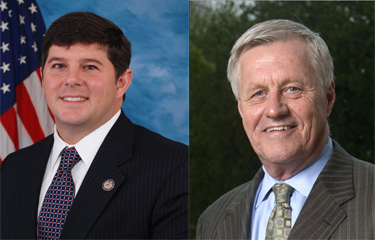A bill designed to develop and support offshore aquaculture in the United States is getting a second chance at passing in the U.S. House of Representatives this week.
U.S. Representatives Steven Palazzo (R-Mississippi) and Collin Peterson (D-Minnesota), House Agriculture Committee Chairman, reintroduced the bipartisan Advancing the Quality and Understanding of American Aquaculture (AQUAA) Act on Wednesday, 11 March.
A previous version of the bill was introduced in 2018, but died when Congress’ term ended at the beginning of January 2019.
The AQUAA Act would establish national standards for sustainable offshore aquaculture and clarify a regulatory pathway for offshore aquaculture in the U.S. exclusive economic zone, from 12 miles offshore out to 200 miles offshore. Supporters of the bill say the economic benefits of offshore aquaculture include job creation, investment in coastal communities, and expanded markets for wild-caught seafood. The expansion of aquaculture would also be a boon for U.S. soybean, corn, and pea farmers, as those products can be used to create fish feed, easing pressure on ocean resource, according to Peterson.
“Aquaculture is a fast-growing agriculture industry that is creating jobs and improving our country’s food security,” Peterson said. “It also creates a market for soybeans as they provide nutritious aquafeed. Our bill will streamline the permitting process and build upon research and development efforts that are underway.”
Stronger America Through Seafood (SATS), an advocacy group for U.S. seafood producers, applauded the reintroduction of the bill in a statement.
“A predictable regulatory framework and National Standards for aquaculture production are critical to the competitiveness of the American seafood industry, which currently faces a seafood trade deficit of USD 14 billion [EUR 12.5 billion],” SATS President and High Liner Foods Vice President of Corporate Sustainability and Government Affairs Bill DiMento said. “Aquaculture is the fastest-growing food sector in the world, but the U.S. ranks only 16th in the production of farm-raised seafood. Half of the fish eaten in the United States comes from farms – but not from American farms. We can do better. With global demand for seafood projected to increase by 70 percent in the next 30 years – domestic aquaculture, combined with our wild fish harvesting – could one day meet the entire U.S. demand for seafood. Federal legislation is an important first step.”
In October, Senator Roger Wicker (R-Mississippi) announced that he intends to reintroduce a companion bill in the Senate sometime this year.
“America imports over 90 percent of the seafood we consume. Simply put, there is not enough fresh, healthy, and local seafood produced in the United States to meet consumer demand,” Wicker said during a hearing on the bill. “My legislation would create a set of national standards for sustainable aquaculture, similar to the standards set by the Magnuson-Stevens Act. Because of the Magnuson-Stevens Act, the U.S. has the best managed fisheries in the world. We should lead the world in aquaculture management.”
“The AQUAA Act streamlines the federal permitting process to usher in a wave of American aquaculture and reduce our dependency on foreign seafood imports while we grow a sustainable market,” Palazzo said. “Food security is national security and we must work to ensure America is prepared to meet the needs of tomorrow’s food demand.”
Sean J. O’Scannlain, the CEO and president of Bensenville, Illinois, U.S.A.-based seafood distributor Fortune International, issued a statement on 12 March backing the bill.
“The expansion of offshore aquaculture in U.S. waters is critical for our business and the entire domestic seafood industry,” he said. “The United States is falling behind in aquaculture production and we should be leading this industry in our own waters. We have the most talented scientists in the world working on aquaculture, yet they are developing it for other countries. We need to act now and increase the production of American-raised seafood.”
While there are a number of industry leaders who support the AQUAA Act, others in the fishing community and some environmental nonprofits had questions about the previous version of the bill. A joint press release issued 12 March from the Don’t Cage Our Ocean Coalition, the Recirculating Farms Coalition, Friends of the Earth, the Northwest Atlantic Marine Alliance, and Food & Water Watch criticized the reintroduction of the bill.
“Congress should stop the AQUAA Act now – this is an outdated, dangerous and unnecessary method of raising fish,” Recirculating Farms Coalition Executive Director Marianne Cufone said. “While increasing availability of domestic seafood for U.S. consumers is an important goal, political leaders have a responsibility to invest in more sustainable ways to produce seafood than factory-style farming in the ocean.”
Photos courtesy of Wikipedia







